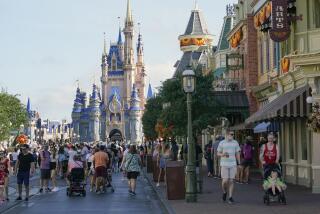Euro Disney’s Loss Balloons as Visits Dip
- Share via
Debt-laden Euro Disney reported Monday that its net loss nearly doubled during the last year, reflecting Europe’s tender tourism market along with increased operating costs for the company’s newest theme park.
Euro Disney -- which is 39.1% owned by Burbank-based Walt Disney Co. -- attributed the wider loss to the “prolonged downturn in European travel and tourism, strikes and work stoppages throughout France during the year, combined with challenging general economic conditions.”
More than 12.4 million people visited the two parks that constitute Euro Disney in the fiscal year that ended Sept. 30, down from 13.1 million during the previous year. Hotel occupancy rates were 3% lower.
Euro Disney Chairman Andre Lacroix told reporters that he was confident the company would overcome its financial troubles. He also predicted a rebound in visitors to France’s largest tourist attraction in the spring.
“We expect a recovery in growth from March on,” Lacroix said.
The company has launched a European advertising blitz to lure visitors to the two parks -- 11-year-old Disneyland Paris and the Walt Disney Studios Park, which opened in March 2002.
Although Euro Disney didn’t break out the number of visitors to the newer park, the fiscal year results showed that the business it did wasn’t enough to offset the effects of the economic malaise and the company’s higher operating and advertising costs.
Euro Disney said it suffered a loss of nearly $66 million for the year, up from nearly $39 million for the previous year. Revenue fell by 2.1% to $1.24 billion from a year earlier.
On a positive note, theme park spending per guest was up 1.5% to nearly $48.
Media analyst Jeffrey Logsdon of investment bank Harris Nesbitt Gerard agreed that the economy and French transit strikes undermined park attendance. The weaker dollar also has made it more expensive for U.S. tourists to travel overseas, he noted, thus discouraging another potential pool of visitors.
“But you build theme parks by looking at a 10-year demand, not a 10-month demand,” said Logsdon, who tracks Disney. “And these parks were built for their long-term prospects.”
Analysts had been bracing for bad news from the company, which is under pressure to restructure its debt load.
Euro Disney must come up with a new financing structure by March 31, when a six-month waiver granted by its various lenders expires.
Two weeks ago, Disney issued a $52-million line of credit to the European theme park operator to use as a safety net while it restructures its debt.
That money is expected to be tapped if Euro Disney exhausts its existing $193-million Disney credit line.
In addition, Disney earlier this year agreed to waive royalties and management fees paid by Euro Disney for much of the 2003 fiscal year to give the park operator breathing space to meet its other bank obligations.
Euro Disney’s looming restructuring plan is important, said media analyst Tom Wolzien of Bernstein Research, because California-based Disney “is the lender of last resort.”
Disney essentially leases the European park assets from various financiers through its wholly owned subsidiary, Euro Disney Associes S.N.C. That unit subleases the facilities to the operator of the parks, Paris-based Euro Disney. The leasing agreement expires in 2006.
In a Securities and Exchange Commission filing in August, Disney disclosed a worst-case scenario in which the company could lose as much as $1.3 billion should it decide to terminate its lease agreements with its financiers. For that to happen, Euro Disney’s operator would have to decide not to exercise its renewal option in 2006. Then the Disney subsidiary could “purchase the assets, continue to lease the assets or elect to terminate the lease.” If it elected to terminate, the Disney subsidiary would owe the $1.3-billion fee to the financiers.
*
Reuters was used in compiling this report.
More to Read
Inside the business of entertainment
The Wide Shot brings you news, analysis and insights on everything from streaming wars to production — and what it all means for the future.
You may occasionally receive promotional content from the Los Angeles Times.











